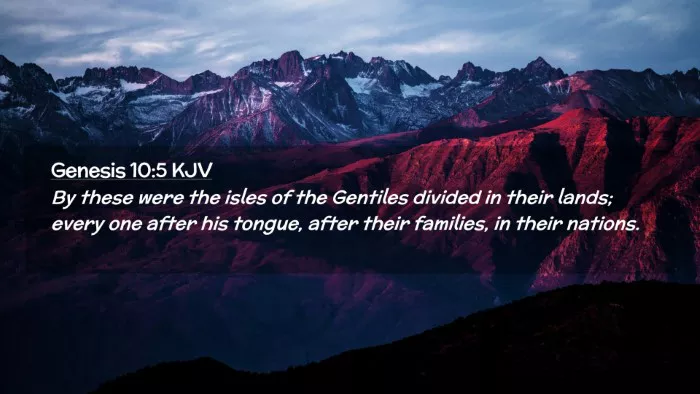Read the Daily Bible Verse Genesis 10:5 To Strengthen Your Spiritual Journey.
Genesis 10:5 (KJV):
“By these were the isles of the Gentiles divided in their lands; every one after his tongue, after their families, in their nations.”
Background of Genesis 10:5
Genesis 10:5 is part of the “Table of Nations,” a genealogical record found in Genesis 10 that details the descendants of Noah‘s sons—Shem, Ham, and Japheth—following the flood. This chapter is often referred to as the ethnographic map of the ancient world. Genesis 10:5 specifically deals with the descendants of Japheth, who are often associated with the regions that became the nations of the Gentiles, or non-Jewish peoples. The phrase “isles of the Gentiles” suggests coastal and island nations, particularly those in the Mediterranean region.
Meaning of Genesis 10:5
The verse highlights the division of lands among the descendants of Japheth, emphasizing that this division occurred along linguistic and familial lines. This is an early indication of the diversity of human cultures and languages. The “isles of the Gentiles” refers to the distant lands and nations that were settled by Japheth’s descendants. The phrase “every one after his tongue” underscores the importance of language in the formation of distinct cultural identities. This verse is a testament to the fulfillment of God‘s command to Noah and his sons to “be fruitful, and multiply, and replenish the earth” (Genesis 9:1). It also sets the stage for the later biblical narrative of the Tower of Babel, where the diversification of languages reaches a pivotal moment.
See also: What Does Genesis 10:1 Mean?
Application of Genesis 10:5 in Life
In a modern context, Genesis 10:5 can be applied to the understanding of human diversity as part of God’s design. It encourages the recognition and appreciation of cultural and linguistic differences as elements of the divine plan. As believers, we are called to respect and value the various “nations” and “tongues” that God has established. This verse also serves as a reminder that all nations and peoples are part of God’s creation, and thus, the message of the Gospel is universal, meant for every “nation, and kindred, and tongue, and people” (Revelation 14:6). Practically, this can lead to greater efforts in cross-cultural ministry and missions, as well as a commitment to unity within diversity in the body of Christ.
Comparison with Other Biblical Texts
Genesis 10:5 can be compared with other passages that deal with the spread of nations and the establishment of languages. For instance, the Tower of Babel narrative in Genesis 11:1-9 shows how God further diversified languages to disperse humanity across the earth, which can be seen as a continuation of the process described in Genesis 10:5. Additionally, Acts 17:26-27 speaks of God’s sovereignty in determining the boundaries of nations and His desire for all people to seek Him. This reinforces the idea that the division of nations, as described in Genesis 10:5, is part of God’s providential plan for humanity.
Modern Relevance
In today’s globalized world, Genesis 10:5 remains relevant as it speaks to the origins of the world’s nations and languages. The verse encourages a biblical perspective on ethnicity and nationality, recognizing that all peoples have their origin in God’s creative purpose. This understanding can promote unity and cooperation among different ethnic groups, grounded in the belief that diversity is part of God’s good creation. Moreover, as conflicts often arise from nationalistic and ethnic divisions, this verse calls believers to be agents of reconciliation, emphasizing our shared humanity under God’s sovereignty.
Conclusion
Genesis 10:5 is a profound verse that touches on the themes of human diversity, cultural identity, and divine sovereignty. It provides a foundation for understanding the spread of nations and languages in the ancient world and offers timeless lessons for modern believers. As we reflect on this verse, we are reminded of God’s hand in the unfolding of human history and the importance of recognizing the dignity and value of all peoples as part of His creation.
Comments on Genesis 10:5
“Genesis 10:5 is a reminder of the rich tapestry of humanity, woven together by God’s design. It calls us to embrace our differences while recognizing our common origin in Him.”
“This verse sets the stage for the diverse nations and cultures we see today, reminding us that diversity was part of God’s plan from the beginning.”
“The ‘isles of the Gentiles’ mentioned here highlight the early spread of humanity across the earth, emphasizing the importance of language and culture in shaping nations.”
“Genesis 10:5 challenges us to see the world through a biblical lens, where all nations are part of God’s creation and are equally deserving of His love and grace.”


